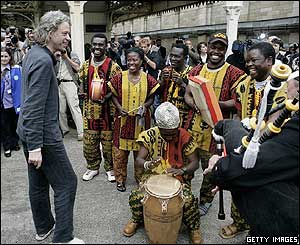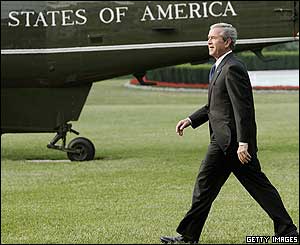
SIR BOB GELDOF IN EDINBURG
Posted by Picasa

G8 PROTEST MARCH
Posted by Picasa

G8 PROTESTER
Posted by Picasa

G8 PROTESTER NICE POSTER EH!
Posted by Picasa

SQUEEZING THE LAST PENNY OUT OF THE POOR Posted by Picasa
All men recognize the right of revolution; that is, the right to refuse allegiance to, and to resist, the government, when its tyranny or its inefficiency are great and unendurable.
"Under a government which imprisons any unjustly... the true place for a just man is also a prison."
Henry David Thoreau (1817-1862)
It seems only fitting to mention Thoreau after talking about Sir. Bob Geldof & his organizing LIVE8 with the intention to make world hunger & third world debt a priority for world leaders taking part in the G8 summit in Scotland this week. Thoreau argued that unjust laws & policies of a government should be resisted through non-violent means of Civil Disobedience to bring about the desired changes. He argues that such resistance is the right & the duty of the individual.
Below are some bits gleaned from the website THOREAU READER:
"Henry David Thoreau (1817-1862) exerted a profound, enduring influence on American thought and letters. His famous experiment in living close to nature, and his equally famous night in jail to protest an inhuman institution(slavery) and an unjust war(the Mexican-American war), are distilled in his best known works, Walden and "Civil Disobedience."
Thoreau's elevation of conscientious integrity in an era of social conformism, his passionate opposition to the institutional degradation of human life and values, and his enduring literary production as an author, public speaker, and natural scientist — all expressed in a distinctive prose style at once classic and personal — place him at the heart of the era now known as the American Renaissance.
Almost buried beneath the weight of Thoreau's status as a literary classic and popular icon is an extraordinary wealth of thought and insight for people today. The philosopher Stanley Cavell writes that Thoreau's achievement "is still, if one can imagine it, not fully recognized." And literary scholar Lawrence Buell predicts that Thoreau will be "an even more luminous and inspirational figure in the 21st century than he has been in the twentieth."
" Thoreau's essay "Civil Disobedience", although it is seldom mentioned without references to Mahatma Gandhi and Martin Luther King jr. " has more history than many suspect.
In the 1940's it was read by the Danish resistance, in the 1950's it was cherished by people who opposed McCarthyism, in the 1960's it was influential in the struggle against South African apartheid, and in the 1970's it was discovered by a new generation of anti-war activists. The lesson learned from all this experience is that Thoreau's ideas really do work, just as he imagined they would."
"when, in the mid-1950's, the United States Information Service included as a standard book in all their libraries around the world a textbook of American literature which reprinted Thoreau's 'Civil Disobedience,' the late Senator Joseph McCarthy of Wisconsin succeeded in having that book removed from the shelves — specifically because of the Thoreau essay." - Walter Harding, in The Variorum Civil Disobedience
Below is an excerpt from Thoreau's essay On the Duty of Civil Disobedience
[1849, original title: Resistance to Civil Government]
" I heartily accept the motto, "That government is best which governs least"; and I should like to see it acted up to more rapidly and systematically. Carried out, it finally amounts to this, which also I believe--"That government is best which governs not at all"; and when men are prepared for it, that will be the kind of government which they will have.
The mass of men serve the state thus, not as men mainly, but as machines, with their bodies. They are the standing army, and the militia, jailers, constables, posse commitas, etc. In most cases there is no free exercise whatever of the judgment or of the moral sense; but they put themselves on a level with wood and earth and stones; and wooden men can perhaps be manufactured that will serve the purpose as well. Such command no more respect than men of straw or a lump of dirt. They have the same sort of worth only as horses and dogs. Yet such as these even are commonly esteemed good citizens. Others--as most legislators, politicians, lawyers, ministers, and office-holders--serve the state chiefly with their heads; and, as the rarely make any moral distinctions, they are as likely to serve the devil, without intending it, as God. A very few--as heroes, patriots, martyrs, reformers in the great sense, and men--serve the state with their consciences also, and so necessarily resist it for the most part; and they are commonly treated as enemies by it.
From website:
Thoreau Reader
Readable online editions of Thoreau’s works, some annotated, with an introduction to Thoreau, images, essays etc.
http://eserver.org/thoreau
updated july04,2005
GORD.
No comments:
Post a Comment